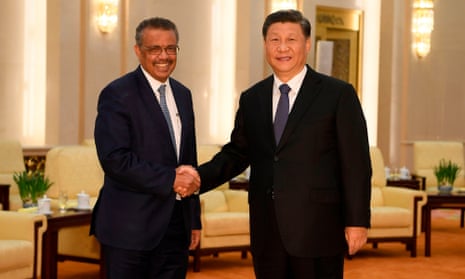The Chinese president, Xi Jinping, has been noticeably absent from public view as his government scrambles to fight the coronavirus outbreak that claimed more than 400 lives and infected more than 20,000 people.
His most recent public appearance was on 28 January when he met the director general of the World Health Organization in Beijing and said he was “personally commanding” the response to the outbreak.
Yet Xi does not appear to be the face of the government’s fight against the virus. He has not been pictured visiting hospitals, doctors or patients. In the days after officials acknowledged the gravity of the crisis it was the premier, Li Keqiang, who visited Wuhan, the city at the centre of the outbreak. While photos of a long convoy prompted rumours over the weekend that Xi was on his way to Wuhan, he has yet to turn up.
Instead, state media have portrayed him as in command from a distance, issuing pledges to overcome the “devil virus” and approving measures such as the deployment of 1,400 military medics at a new hospital in Wuhan. On Monday, Xi chaired a meeting of the Communist party’s ruling politburo standing committee and ordered officials to work together to improve the country’s emergency response system and public health regime.
For a leader whose face and words decorate banners and signs across the country and feature in state media daily, the low-key approach during a time of national crisis seems out of character.
“This is clearly one of the most serious issues to confront China in decades. Xi has heavily centralised power in himself, cultivated a populist image, and vested himself with the title of ‘people’s leader’,” said Carl Minzner, a professor of Chinese law and politics at Fordham University. “Failing to publicly address the issue would seem likely to harm his populist image.”
Some experts say the approach may be deliberate. Xi, who has aggressively centralised power and made himself the core of the Communist party, may be more at risk to the political fallout of the coronavirus. Local government officials have so far borne the brunt of criticism, but as the central government handles the crisis more scrutiny will be placed on top officials.
“If the situation improves, he will take credit. If it worsens the blame will be pinned on Li Keqiang,” said Willy Lam, an adjunct professor at the Chinese University of Hong Kong.
Some of the central-level efforts were approved by Xi, such as a lockdown in Wuhan and surrounding cities when there was not enough medical supplies and hospital capacity to cope with the number of patients.
Xi’s absence from the scene has been noticed. “He has not visited places hard hit by the virus,” Lam said. “This has been criticised in part because Xi claims to be the core of the leadership, the all-powerful leadership … and he doesn’t have the guts to go the epidemic-stricken areas.”
Previously available comments about Xi’s absence that mockingly used the term “personally commanding” appear to have been removed from the Chinese social media platforms Weibo and Douban.
A post titled “What Xi Dada has been doing these days” on the site Pincong.rocks, a Chinese-language discussion forum hosted overseas, included a timeline of his meetings and directives given in relation to the virus.
“Maybe he’s already found a safe place to hide and quarantine himself,” a commentator said in response to the post. “Maybe he is with all those face masks that have gone missing in Wuhan,” another said, in reference to the city’s shortage.
